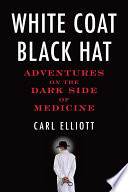
White Coat, Black Hat
Adventures on the Dark Side of Medicine
ماجراهای مربوط به جنبه تاریک پزشکی
کتاب های مرتبط
- اطلاعات
- نقد و بررسی
- دیدگاه کاربران
نقد و بررسی

December 20, 2010
While most people are vaguely aware of the uncomfortable symbiosis between doctors and the pharmaceutical industry, few would believe the flagrant bribery and brow-beating that occurs, according to Elliott's (Better Than Well) latest. Pharmaceutical companies have overwhelming influence over research studies, grant funding, and the decisions or suggestions that doctors make regarding the care of their patients. As the financial stakes continue to increase, the pharmaceutical industry has an even greater incentive to obfuscate potentially harmful findings about their products. Elliot, a professor of bioethics at the University of Minnesota, methodically exposes every aspect of the connection between Big Pharma and medicine, interviewing experiment subjects, doctors, pharmaceutical sales reps, and others on the frontlines of the issue to give readers a thorough understanding of what lies behind a simple prescription. Employing often shocking stories to reveal larger ethical problems in the industry, Elliott offers no easy answers in an effort that informs and inflames in equal measure.

May 15, 2010
Elliott (Bioethics/Univ. of Minnesota; Better than Well: American Medicine Meets the American Dream, 2003, etc) examines the part played by the pharmaceutical industry in constructing"a medical system in which deception is often not just tolerated but rewarded."
While some abuses—including the use of subjects to test drugs without informed consent—are not new, these practices continue despite the existence of regulatory institutional-review boards set up by Congress, because these too have now become profit centers. Elliott writes that pharmaceutical companies hire PR specialists who not only supply educational materials to promote products, they also train medical professionals to be"opinion leaders" and even write papers in their name. In 1998, the Journal of the American Medical Association"found evidence of ghost authorship in 11 percent of articles published in six major American medical journals." In the late-'90s, articles touting the benefits of the weight-loss drug Fen-Phen—later taken off the market because of potentially fatal side effects—were a key piece in a"complex multimillion-dollar public relations strategy" that minimized worries about the safety of the drug. Market-research firms, writes the author, profile doctors as a preliminary to major sales campaigns offering them tickets to sports events and inviting them on junkets in order to persuade them to become advocates for new drugs. Further, medical professionals are offered research grants and paid large honorariums for speaking engagements and other events. Disguised marketing is even more insidious—e.g., treating menopause as a disease that transforms a woman into a"dull-minded but sharp-tongued caricature of her former self" in order to promote estrogen-replacement therapy.
The author provides little information that informed readers don't already know, but the gripping anecdotal evidence has important societal implications.
(COPYRIGHT (2010) KIRKUS REVIEWS/NIELSEN BUSINESS MEDIA, INC. ALL RIGHTS RESERVED.)

June 15, 2010
As a physician and philosopher, Elliott (bioethics, Univ. of Minnesota; Better Than Well) uses his own experience and interviews with others on the inside to take a jaundiced look at several aspects of modern medicine. He explains the ways subjects are recruited for research (some actually participating in one study after another for the cash); how medical articles are really written (often by ghostwriters from "medical communication companies"); the world of drug reps; how thought leaders are used by the pharmaceutical and device industries and how that warps continuing medical education; the rise to prominence of public relations; and the sometimes shaky ethical world of, yes, bioethicists. The common thread is money--where it comes from and how uniformly it affects all of these areas. It's fascinating to read comments from prominent physicians who declaim the negative influence of industry connections while working as paid consultants and speakers for those same industries. VERDICT Enjoyable to read and laced with sardonic wit, this is an eye-opening work that all consumers of health care should read.--Dick Maxwell, Porter Adventist Hosp. Lib., Denver
Copyright 2010 Library Journal, LLC Used with permission.

Starred review from July 1, 2010
Any physician knows that the careless mingling of certain medical interventions can lead to unwantedeven fatalconsequences for the patient. That explains why physician-philosopher Elliott decided to pen this cautionary book, exposing example after example of the adverse effects of mixing capitalism with the practice of medicine. It leads, he says, to a situation where there is no true advocate for the patient. Patients have become health-care consumers shopping for the best medical bargains they can find. In such an atmosphere, neither the pharmaceutical company nor the medical researcher, not even ones own doctor, can be relied upon to place a patients best interests above profits. Besides the obvious perils inherent when a physician accepts gifts from pharmaceutical and medical-equipment salespeople, there are risks when authorities trusted with oversight also have conflicts of interest. Many medical journals depend upon corporate advertising, and clinical-trial oversight committees are populated with people who are on a pharmaceutical companys payroll. Moreover, because medical research has become so proprietary, he notes, no one is sharing basic discoveries, resulting in needless duplication of efforts that can delay or kill advanced scientific developments. Elliotts dim view ought to be a real eye-opener for health-care patients-cum-consumers.(Reprinted with permission of Booklist, copyright 2010, American Library Association.)

























دیدگاه کاربران